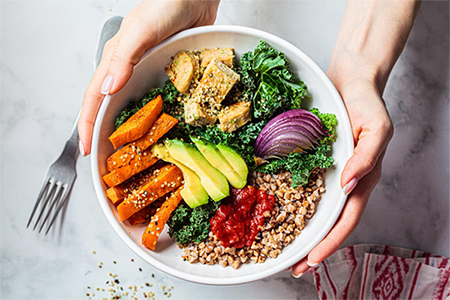
Nutrition plays a significant role in recovery after orthopedic surgery. According to the National Institutes of Health, patients who lack adequate nutrient intake have longer lengths of stay, higher readmission rates, a greater number of complications, and higher mortality risks.1 Whether you have undergone knee, shoulder, or any other orthopedic surgery, your nutrition should be a top priority. The foods you consume after surgery are vital to tissue repair, muscle preservation, and overall health.
Focus on increasing your nutrient intake by consuming the following.
Protein: Protein is essential to muscle and tissue repair. Adequate protein intake can help prevent muscle atrophy, which is a common concern among athletes. Good protein sources include chicken, turkey, fish, lean beef, greek yogurt, low-fat cottage cheese, egg whites, beans, legumes, tofu, and tempeh.
High-Fiber Foods: High-fiber foods can help prevent constipation, which is a common side effect of surgery. Fibrous foods include fruits, vegetables, whole grains, nuts, and seeds. A smoothie is a great way to increase your fiber intake. Consider putting some spinach, fruit, chia, and flax seeds in your smoothie for added fiber.
Whole Grains: Whole grains are full of fiber and are a great source of energy, which your body needs for recovery. Oats, whole grain rice, quinoa, millet, farro, barley, and whole grain pasta and bread are all great options.
Fruits and Vegetables: Fruits and vegetables contain fiber, antioxidants, and essential vitamins and minerals that are crucial to the healing process. Make sure that you get enough Vitamin C in your diet. A few foods that are rich in Vitamin C are citrus fruits, peppers, tomatoes, and broccoli.
Healthy Fats: Foods that contain Omega 3 fatty acids fight inflammation in the body and aid in vitamin absorption. They can be found in halibut, salmon, tuna, flaxseeds, chia seeds, and walnuts.
Water: Hydration is essential to the healing process. Water transports nutrients, and helps prevent constipation. Don’t wait until thirst hits you. Consistently sip on water throughout the day. It’s important to note that caffeine and alcohol can cause dehydration so both should be limited or excluded while recovering.
Calcium and Vitamin D: Calcium and vitamin D are essential to maintain strong bones. Calcium can be found in yogurt, milk, cheese, spinach, and leafy greens. Vitamin D is found in some fatty foods such as salmon, sardines, cheese, and egg yolks. Sunlight is crucial for vitamin D synthesis, so during winter months some people may benefit from supplementation.
Surgery takes a toll on your body. One of the best actions you can take to optimize your healing is to focus on a nutrient-dense diet. With March being National Nutrition Month, there is no better time to focus on your health. Stay committed to prioritizing your nutrient intake as you recover from surgery so you can experience a successful recovery.
Dr. Kai Mithoefer is board-certified in both Orthopedic Surgery and Orthopedic sports medicine specialist. Dr. Mithoefer is an internationally recognized specialist for complex shoulder and knee injuries with over 15 years of experience with the treatment of sports-related injuries. Dr. Mithoefer has published more than 100 scientific articles and book chapters and is a frequent speaker at national and international orthopedic meetings.











